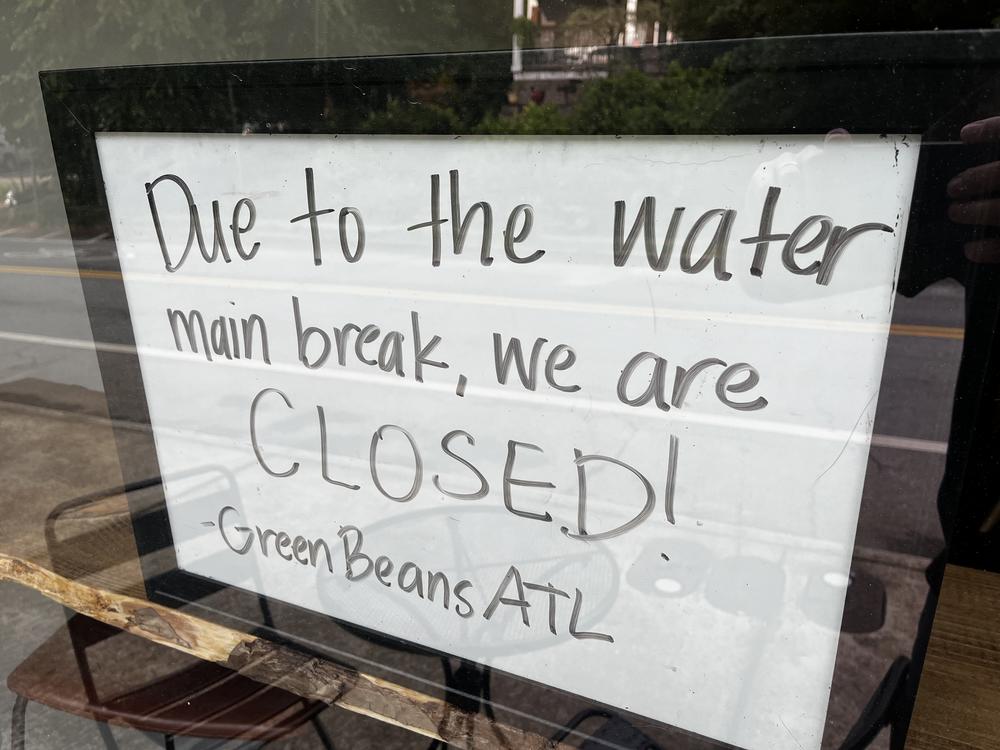
Section Branding
Header Content
Georgia Today: Water woes continue in ATL; Georgia opts out of Summer EBT; ATL United fires coach
Primary Content
LISTEN: On the Monday, June 3 edition of Georgia Today: Some Atlanta residents and businesses are still without water services following the breakdown of several water mains over the weekend; Georgia opts out of a federal program providing assistance to families in need during the Summer months; and Atlanta United fires its head coach.

Peter Biello: Welcome to the Georgia Today podcast from GPB News. Today is Monday, June 3. I'm Peter Biello. On today's episode, we'll look at how the age of Atlanta's pipes and population growth have contributed to the city's water woes. Georgia opts out of a federal program providing assistance to families in need during the summer months. And Atlanta United fires its head coach. These stories and more are coming up on this edition of Georgia Today.
Story 1:
Peter Biello: After a series of water main breaks that began Friday in Atlanta, many residents remain without drinkable water. GPB's Amanda Andrews reports business owners are demanding financial relief.
Amanda Andrews: Organizers from the Black Futurist Group showed up at an Atlanta City Council meeting to demand emergency relief for businesses, more funding for public works and a timeline for when repairs will be completed. The proposed relief would include up to $10,000 for small businesses and up to $25,000 for larger ones. Trinket Lewis owns a juice bar in Southwest Atlanta. She says every day without water matters.
Trinket Lewis: This is our high season, so we're looking at if we don't make our quota in the summertime, then obviously in the wintertime we're extremely affected. So over the last three days — three days — our sales have decreased between 58% and 62%.
Amanda Andrews: The city of Atlanta has yet to release a timeline on when the pipes will be repaired and water fully restored. For GPB News, I'm Amanda Andrews in Atlanta.

Story 2:
Peter Biello: The state of emergency is still in effect for a large portion of Atlanta this afternoon as the city continues to repair broken water mains, which wreaked havoc over the weekend. Since Friday, some residents have gone without water and businesses and government offices have temporarily closed. GPB will continue to provide updates as the situation evolves. But for a broader view of this infrastructure failure, we turn to Dr. Iris Tien. She's an associate professor in the School of Civil and Environmental Engineering at Georgia Tech. Dr. Tien, welcome to the program.
Dr. Iris Tien: Thanks for having me.
Peter Biello: It's not uncommon for cities to experience a water main break, but how could it be that several major and minor water main breaks flooded city streets at the same time?
Iris Tien: So that's one of the things that we look at in looking at these infrastructure systems that are all connected. And so we have this thing called cascading effects and cascading failures and outages, where one failure is actually the trigger effect for follow-on cascading failures through the system. And so in this case, with the water main break, once one of the mains breaks the flow, is just rerouted through other parts of the system, which can stress other parts of the network. And so it's actually not necessarily a coincidence that they would fail together, but it's actually that one of these breaks triggers these other main breaks like a domino effect.
Peter Biello: I see. And can you talk a little bit about the age of Atlanta's water infrastructure and how the growth of the city, maybe, has impacted infrastructure like water mains?
Iris Tien: Certainly. So this is one of the things that we see across the U.S. In Atlanta, as well as in other cities across the U.S. is this whole issue of aging infrastructure. So we have these systems that have been designed for maybe 50 years, maybe up to 100-year service lives. But we're really near that mark and a lot of Atlanta system is — is past that 50-year mark. And so we see these systems that are aging. And so without enough resources to replace things before they potentially break, we see these failures across the system where we have these aging components, which then can cause other components to fall as well.
Peter Biello: What possible role does a changing climate play in what we're experiencing now?
Iris Tien: That's an interesting question. There's a lot of work and research in terms of how changing demands can put additional stresses on the system. And so certainly as systems get used more and more, the stresses on the system also increase. And that could potentially shorten their lifetime or increase the demands on the structural components, certainly. And there are also questions about increased flooding and saturation of the soils might also potentially lead to the shifting soils where these buried infrastructure assets are located. And that could also potentially affect the performance of these pipelines.
Peter Biello: What can be done in a city like Atlanta that's old, but that's experienced a lot of growth, that could address this problem, not in a Band-Aid solution kind of way, but in a way that comprehensively addresses the issue?
Iris Tien: That's one of the tricky things with infrastructure, is that they are very long-lived assets, and they're continually being built on and expanded. And so a system like the city of Atlanta has this original backbone, but then with development, new assets are added on. And so we have this conglomeration of new assets, old assets. We have different levels of information about them. And so there's varying potential ways that we could address some of these issues. One of the first is even just knowing where everything is and how everything is connected. And so we have that — that data question first. And then there's also ways that we could implement new technologies, things like sensor monitoring to track potential leaks that might be a precursor to a larger break. There are different potential redundancies we could build into the system at the more local scale, but also at the utility level. And so there's different things that, from a research point of view we're looking at as well from different household to local-scale solutions, to potential utility-scale solutions, to build in more redundancies and backups to these systems so that when a potential outage or disruption happens, that the system is able to recover and find new ways to to be able to almost automatically recover and provide services to the populations that need them.
Peter Biello: Dr Iris Tien, associate professor in the School of Civil and Environmental Engineering at Georgia Tech, thank you so much for speaking with me about this.
Dr. Iris Tien: My pleasure.

Story 3:
Peter Biello: A federal appeals court is blocking an Atlanta venture capital fund's grant program for Black women owned businesses. The 2 to 1 decision, issued today by a panel of the 11th Circuit U.S. Court of Appeals, comes in a lawsuit that has become emblematic of a growing legal backlash against corporate diversity programs. The panel's majority opinion ruled the Fearless Fund likely violates federal civil rights laws and inflicts irreparable harm. Its dissenting opinion compared those injuries to those faked by athletes. The nonprofit advocacy group Digital Undivided says less than 1% of venture capital funding goes to businesses owned by Black or Hispanic women.
Story 4:
Peter Biello: Georgia is opting out of a federal program that would give families extra money to feed their kids this summer. The so-called Summer EBT program is an extension of pandemic EBT, which had near-national enrollment and ended last year. GPB's Sofi Gratas has more.
Sofi Gratas: With Summer EBT, families in some states enrolled in SNAP or with kids eligible for the National School Lunch program will get $40 a month for three months per child — but not in Georgia. Kelsey Boone, with the Food Research and Action Center, says during COVID, the former program helped reduce food insecurity.
Kelsey Boone: So when you take that money away, it significantly impacts families, particularly in this time where food inflation is so high and we're still feeling the effects of the pandemic.
Sofi Gratas: Boon says about 1.2 million kids in Georgia would be eligible for Summer EBT. As an alternative, the state will continue to host free summer meal sites at schools and other gathering spots. Some are already up and running. For GPB News, I'm Sofi Gratas.
Story 5:
Peter Biello: Atlanta mayor Andre Dickens joined business owners and city leaders recently for a signing day, launching year three of a summer jobs program for young adults in Atlanta. The Summer Youth Employment Program offers paying jobs to 14- to 24-year-olds. Atlanta already has invested $10 million into wages and stipends for positions with the city, and is now working with private employers to hire participants. So far, over 5,000 students have registered, double the amount this time last year. Atlanta Public Schools Deputy Superintendent Erica Long said the program is crucial for nurturing students.
Erica Long: Long gone are the days of taking the summer off. We try to keep our young people engaged in doing something productive. Today's world requires that of our students. APS is proud to partner with the city of Atlanta to offer this excellent opportunity.
Peter Biello: All students will make at least $15 an hour during their six weeks of employment.
Story 6:
Peter Biello: A Northeast Georgia auto parts manufacturing facility is laying off more than 300 workers. German based ZF Safety told state officials on Friday the company will be closing its factory in Flowery Branch in May or June of next year and moving its production lines to Mexico. A company spokesman says ZF Safety is working to transfer as many workers as possible to its plant in nearby Gainesville. The facility opened in 2007 and makes brake calipers.

Story 7:
Peter Biello: Savannah officials are seeking public comment on a proposed expansion to the city's open container zone for alcoholic beverages. GPB's Benjamin Payne reports.
Benjamin Payne: Currently, Savannians and tourists can walk outside of bars and restaurants with a 16-ounce to-go cup of alcohol, but only in part of downtown. A draft ordinance, though, would expand the to-go cup zone about a mile and a half south, encompassing Savannah's famed Forsyth Park, as well as the Starland District, a trendy neighborhood brimming with many newer establishments. But before council members decide on whether and how to expand the zone, they're asking the public for feedback. Savannah Mayor Van Johnson:
Van Johnson: We want to make sure everyone weighs in. Obviously, to expand anything changes the game for surrounding areas, surrounding communities, and we want residents to add their voice to our decisions.
Benjamin Payne: Residents and visitors alike can submit public comment through a special form on the city's website at savannahga.gov. For GPB News, I'm Benjamin Payne in Savannah.
Story 8:
Peter Biello: In sports, Atlanta United has fired its head coach. The team announced Gonzalo Pineda's departure this morning. It comes after the Five Stripes extended their winless streak at home to six matches in a 3 to 2 loss to Charlotte yesterday. The team has managed only one win in its last 11 games with Pineda on the sidelines, dimming its chances for playoff contention in Major League Soccer. The Braves have the day off today. They beat the Oakland Athletics yesterday 3 to 1. The Atlanta Braves limited the Oakland Athletics to two hits, but overall, the team still needs starting pitching. That's why all eyes were on the Triple-A Gwinnett Stripers yesterday as prospect Hurston Waldrop took the mound. It was his Triple-A debut. The Thomasville, Ga., native was drafted in the first round just last year after having pitched for the Florida Gators, and with his devastating splitter, he was able to strike out 11 batters yesterday. Gwinnett lost the game 3 to 1, but it's possible, given the Braves pitching needs, fans may see Waldrop make his Braves debut sometime this season. In basketball, the Connecticut Sun remained undefeated after beating the Atlanta Dream yesterday 69 to 50. Atlanta got a dozen points and a dozen rebounds from Tina Charles in a game that was part of the WNBA Commissioner's Cup. And in college baseball, the Bulldogs rallied to beat Georgia Tech 8 to 6 last night, winning the Athens Regional and earning a spot in the Super Regionals.
Peter Biello: And that is it for this edition of Georgia Today. If you want to learn more about any of these stories, visit GPB.org/news. And if you haven't yet subscribed to this podcast, take a moment. Do it now. It'll keep us current in your podcast feed. And if you've got feedback, we would love to hear from you. Email us. The address is GeorgiaToday@GPB.org. I'm Peter Biello. Thanks again for listening. We'll see you tomorrow.
---
For more on these stories and more, go to GPB.org/news



